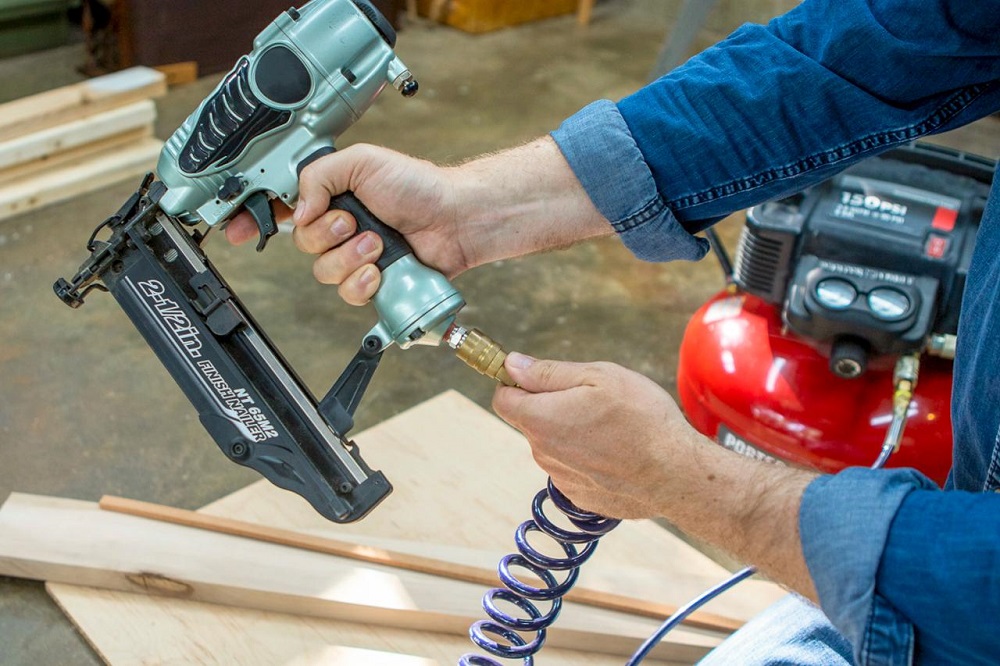
A pneumatic tool sometimes known as air tool, an air-controlled device, or pneumatic-fuelled tool and it is a compressed air-driven or propelled tool. Pneumatic tools are less heavy and less likely to break down than electric-powered tools.
There are Various Kinds of Pneumatic Tools under Two Significant Classifications:
- General Grade Pneumatic Tools: These are low-cost pneumatic tools with a limited lifespan.
- Industrial Grade Pneumatic Tools: These are high-priced pneumatic tools with a long service life.
Chisels, drills, saws, grinders, paint guns, impact wrenches, nailer and stapler, sandblasters, blow gun, jack-hammer, air brush, air ratchet, needle scalar, pneumatic jack, and pneumatic wood borer are some examples of pneumatic tools in the categories above.
Some Important Factors Related To Pneumatic Tools:
- The Project you’re working On: Pneumatic tools come in a variety of shapes and sizes, each of which can only be utilized for certain tasks. A pneumatic saw will not be suitable for tasks that can only be completed effectively with a pneumatic drill. As a result, it's critical to find a pneumatic tool that does exactly what you need.
- The Makers of the Pneumatic Tools: One of the most important factors to consider when purchasing pneumatic tools is the manufacturer's reputation for quality. There are a lot of pneumatic tool manufacturers out there, and if you aren't careful, you may end up with a low-quality pneumatic tool if you don't buy from a renowned company. A respected pneumatic tool manufacturer provides enough information on their tools, customer support, warranty, and assistance in servicing your pneumatic tools, in addition to offering you with high-quality pneumatic tools.
- The Science of Making Things More Comfortable: If you'll be using the pneumatic tool for a long time, make sure it's well-balanced, comfortable to hold, and light enough to be carried for lengthy periods of time. Many manufacturers are now producing pneumatic tools with rubberized grips, chemical and solvent-resistant surfaces, ultra-lightweight metals like titanium, and ballistic-strength nylon-impregnated plastics, as well as tools that can be used one-handed in confined spaces and when changing directions frequently.
- Torque and Pressure: It's a good idea to go behind the manufacturer's torque numbers and figure out what works best for you. Most pneumatic tools work best between 90 psi - 100 psi; any higher pressure will not improve performance. When the pressure on some tools exceeds 120 psi, their performance suffers.
You'll need to know the tool's volume requirements as well as the capacity of your compressor. High-energy users, such as rotary tools, have a high volume, whereas low-energy users, such as oscillatory tools, have a low volume.
Challenges of Working with Pneumatic Tools:
- A pneumatic tool is sensitive to extreme temperature fluctuations.
- The cost of compressed air is higher than the cost of energy.
- Compacted air escaping causes energy loss, it is critical to ensure that there are no breaks in a pneumatic system.
- Pneumatic frames are notorious for creating a ruckus. As a solution, include a silencer in each dump line.
- Installation cost increases when the instrument requires specialty pipes.
- Pneumatic frameworks can't be upgraded to function with smart gadgets
Conclusion:
Pneumatic tools have been around for decades, but only specialists have utilized them. Manufacturers are now designing and marketing pneumatic tools for the do-it-yourself enthusiast. It's critical to properly inspect tools before selecting the best one for the job. Consider any job that has to be done around the house, and there is almost certainly an air tool for it.
Power, control, durability, and lightness are all factors to consider. These are the features that technicians look for in pneumatic tools. Without the power tools that have become such an integral part of everyday life, life as a technician would be a lot more difficult. Before you make a decision, ask your tool distributor a lot of questions.














Social Plugin